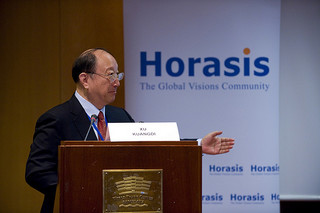Chinese Economy: What To Look Out For
China surpassed the United States as the world’s biggest trader in 2012. How threatening is that?

China may have outperformed the U.S. in international trade in volume last year, but the figure alone does not suffice to explain the concerns of China’s business partners with its growing economy. It is the country’s economic development in areas beyond the trade that the U.S. and the rest of the world should watch out for.
What does “the world’s biggest trader” mean? The figure indicates not how much money China earned in 2012, but instead how many goods and services—measured in terms of value—were exchanged as imports or exports between China and other countries.
There is no indicator, however, of the performance of local economies. Grand as the distinction sounds, it actually says nothing more than that China has been fairly active in buying and selling worldwide. We need more information in order to examine whether China’s economic capacity is truly on the rise.
The U.S., for example, seems to have a vested interest not just in the impact of China’s economy on world trade but on world politics as well, having recently sanctioned several Chinese companies for alleged illicit arm dealings with Syria, Iran and North Korea.
In the past, we have thought of China as the world factory. Everybody involved in international trade should consider China an important player because once it gets angry the worldwide production chain slows down—right? Perhaps.
Years ago, all people ever saw on the tags of their purchases was “Made in China,” but today alternatives reading “Made in Bangladesh,” “Made in India,” etc. are becoming more and more common. The world would never run out of cheap labor, thus China’s role as a world factory should not be a top concern for the President—he wants to move more manufacturing back to the U.S. anyway.
The real thing to watch out for is the fact that China is stepping away from its stereotype. Young Chinese entrepreneurs are looking to move China up along the so-called “smiley curve.” These aspiring moguls have graduated from top MBA programs in America and see China as the promised land of business possibilities. They understand capitalist business models and they know how to mix and match these models with Chines markets, making them prime candidates for transforming China’s domestic economy.
As the biggest world trader, China may also gain an international cultural edge. While not every nation will necessarily experience the same business impact that China has on the U.S., everyone will take the time to learn something about this major economic player or, at the very least, put it on its radar.
As more people worldwide develop an interest in studying Chinese history and culture, more countries will therefore conceive of China as a potential partner in business and diplomacy, helping to drive the country’s future development.
Finally, China has begun to take some initiative in international business through investment overseas. The China National Offshore Oil Corporation, the third-largest oil company in the nation, recently cleared a major economic hurdle in buying Nexen, a Canadian oil and gas company. It is the largest foreign takeover ever made by a Chinese company. Dalian Wanda Group, China’s largest entertainment group, spent $2.6 billion in May 2012 on buying AMC Entertainment Holdings, Inc.
These acquisitions demonstrate a serious Chinese ambition to expand economic operations in the U.S. There will be more to come as the central government opens up to investing overseas. State-owned Chinese enterprises will be the first. Business moguls will follow as soon as the light turns green.
Reach Contributor Yifan Zhu here.



